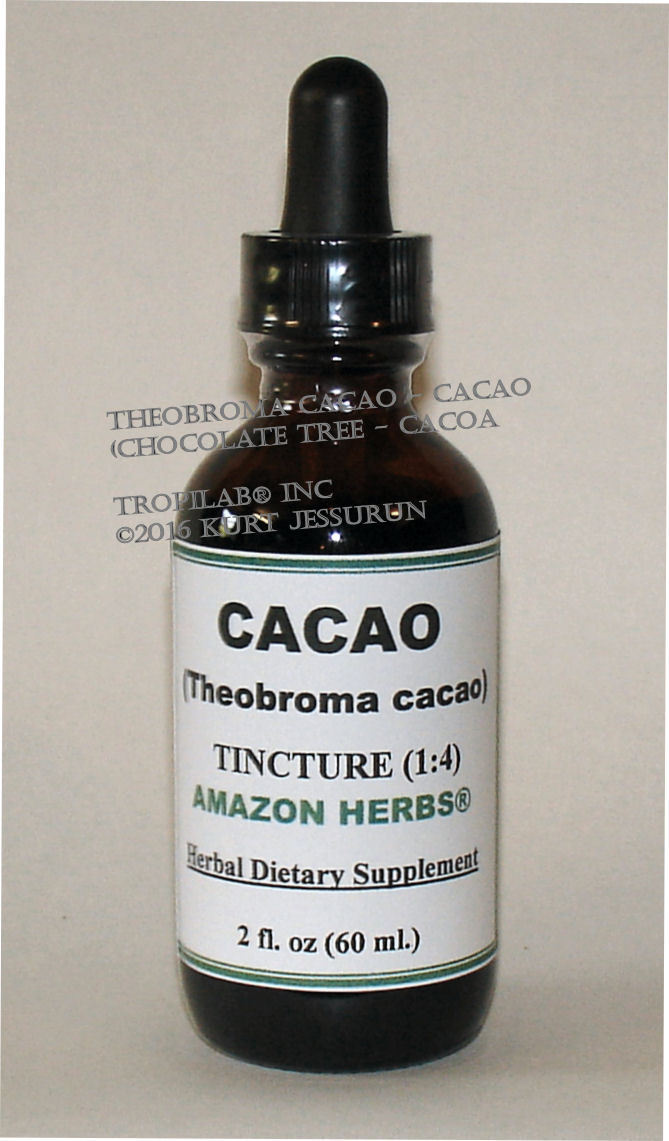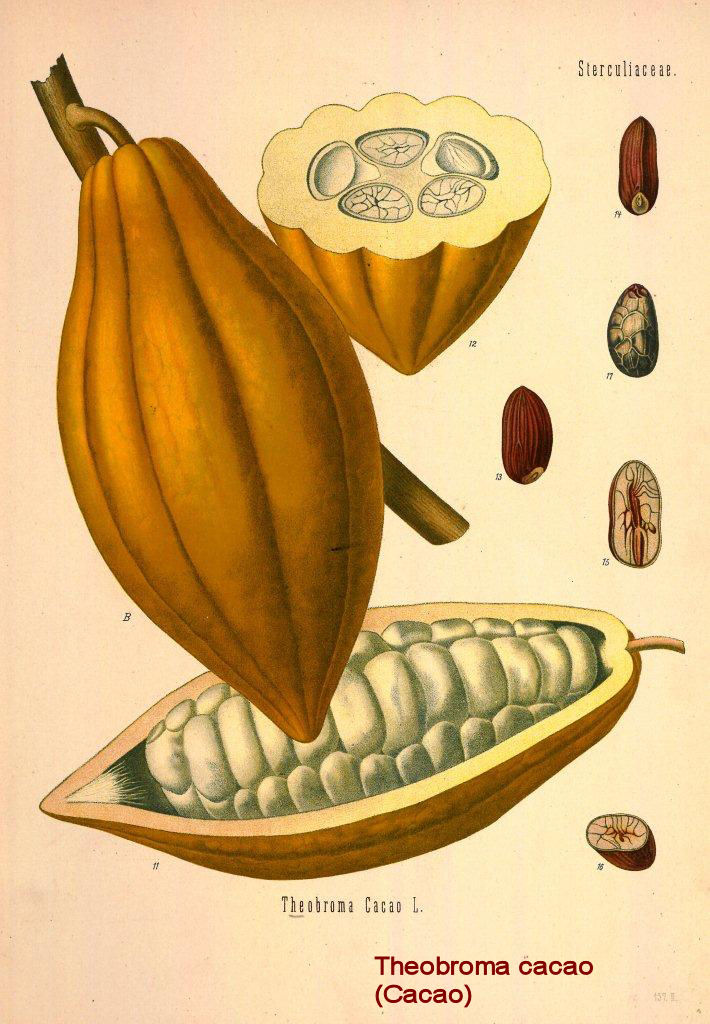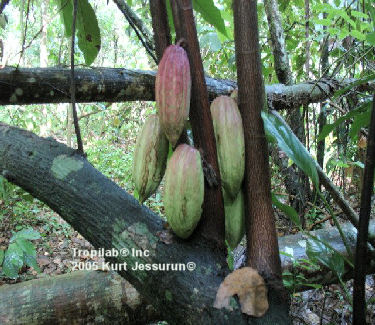 Overview
Overview
Cacao leaves and beans have been with success traditionally used by natives in
South America, such as the Mayas, Olmecs and Aztecs, for its medicinal properties.
Cacao is an Amazon rainforest tree with a history of providing traditional medicines used in South - and
Central America. The medicinal preparations are derived from the leaves and seeds (cacao beans) of the fruit.
Depending on the processing, cacao and its derivative products (chocolate, cacao butter) contain flavonols and
procyanidins (flavonoids).
They possess biological activities relevant to oxidant defenses, vascular health, tumor suppression, and immune function.
Applications
The seeds (beans) possess excellent emollient properties.
Theobromine, the alkaloid contained in the beans, resembles caffeine in its action, but its effect on the
central nervous system (CNS) is less powerful.
 It is also employed in high blood pressure (hypertension) as it dilates the blood-vessels, due to the
flavonoids (antioxidants).
It is also employed in high blood pressure (hypertension) as it dilates the blood-vessels, due to the
flavonoids (antioxidants).
Cacao is a stimulating mood enhancer (natural aphrodisiac) and works against depression.
Dark chocolate reduces platelet activation; this antiplatelet activity explains the important role in
patients with coronary artery disease.
Tropilab uses the herbal tincture of the raw cacao beans and the leaves.
Phyto-chemicals
 The (bitter)cacao beans contain more than 400 plant chemicals!
The (bitter)cacao beans contain more than 400 plant chemicals!
Theobromine is the primary alkaloid found in cacao and chocolate.
Acetic-acid, aesculetin, alanine, alkaloids, alpha-sitosterol, alpha-theosterol, amyl-acetate, amyl-alcohol, amyl-butyrate,
amylase, apigenin-7-o-glucoside, arabinose, arachidic-acid, arginine, ascorbic-acid, ascorbic-acid-oxidase, aspariginase,
beta-carotene, beta-sitosterol, beta-theosterol, biotin, caffeic-acid, caffeine, calcium, campesterol, catalase, catechins,
catechol, cellulase, cellulose, chlorogenic-acid, chrysoeriol-7-o-glucoside, citric-acid, coumarin, cyanidin,
cyanidin-3-beta-l-arabinoside, cyanidin-3-galactoside, cyanidin-glycoside, cycloartanol, d-galactose, decarboxylase, dextrinase,
diacetyl, dopamine, epigallocatechin, ergosterol, ferulic-acid, formic-acid, fructose, furfurol, galacturonic-acid, gallocatechin,
gentisic-acid, glucose, glutamic-acid, glycerin, glycerophosphatase, glycine, glycolic-acid, glycosidase, haematin, histidine, i-butyric-acid,
idaein, invertase, isobutylacetate, isoleucine, isopropyl-acetate, isovitexin, kaempferol, l-epicatechin, leucine, leucocyanidins, linalool,
linoleic-acid, lipase, luteolin, luteolin-7-o-glucoside, lysine, lysophosphatidyl-choline, maleic-acid, mannan, manninotriose, mannose, melibiose,
mesoinositol, methylheptenone, n-butylacetate, n-nonacosane, niacin, nicotinamide, nicotinic- acid, nitrogen, nonanoic-acid, o-hydroxyphenylacetic-acid,
octoic-acid, oleic- acid, oleo-dipalmatin, oleopalmitostearin, oxalic-acid, p-anisic-acid, p-coumaric-acid, p-coumarylquinic-acid, p-hydroxybenzoic-acid,
p-hydroxyphenylacetic-acid, palmitic-acid, palmitodiolen, pantothenic-acid, pectin, pentose, peroxidase, phenylacetic-acid, phenylalanine, phlobaphene,
phosphatidyl-choline, phosphatidyl- ethanolamine, phosphatidyl-inositol, phospholipids, phosphorus, phytase, planteose, polygalacturonate, polyphenol-oxidase,
polyphenols, proline, propionic-acid, propyl-acetate, protocatechuic-acid, purine, pyridoxine, quercetin, quercetin-3-o-galactoside, quercetin-3-o-glucoside,
quercitrin, raffinase, raffinose, reductase, rhamnose, riboflavin, rutin, rutoside, saccharose, salsolinol, serine, sinapic-acid, stachyose, stearic-acid, stearodiolein,
stigmasterol, sucrose, syringic-acid, tannins, tartaric-acid, theobromine, theophylline, thiamin, threonine, trigonelline, tyramine, tyrosine, valerianic-acid, valine,
vanillic-acid, verbascose, verbascotetrose, vitexin.
Pharmacology
The chronic ingestion of flavonol- and procyanidin-rich cacao is associated with a
reduction in low-density lipoprotein (LDL) oxidation and inhibition of platelet function In addition; specific procyanidin
fractions isolated from cacao have demonstrated protection against peroxynitrite-mediated protein damage, as well as
against oxidation of synthetic liposomes and DNA. Studies have shown that purified cacao procyanidin fractions, as
well as a crude extract, can alter cytokine transcription. It seems that these natural products have the potential
to modulate the immune response.
The regular consumption of foods rich in flavonoids is associated with a reduced risk of coronary heart disease, stroke,
and certain cancers.
Flavonoids isolated from cacao have biological activities relevant to oxidant defenses,
vascular health, tumor suppression, and immune function. The intake of certain dietary flavonoids, along with other
dietary substances such as tocopherols, ascorbate and carotenoids, is epidemiologically associated with a reduced risk
of cardiovascular disease. Flavonoids have also been shown to modulate tumor pathology in vitro and in animal models.
The primary alkaloid in cacao, Theobromine, has similar stimulating activity to that of caffeine. It is a weak CNS stimulant,
with one-tenth the cardiac effects of other methylxanthines (caffeine, theophylline). Polyphenols in cacao are similar to
the phenols in red wine, which has been shown to inhibit the oxidation of LDL. Cacao inhibit LDL oxidation and increase
HDL-cholesterol concentrations, this potentially decreases the risk of cardiovascular disease. Extract
of cacao counters the bacteria responsible for boils and septicemia. Polyphenol compounds present in the
cacao liquor, extracted by using ethanol (herbal tincture), have the potential in decreasing the severity of
hepatocarcinogenesis (hepatocellular carcinoma), cancer of the liver.
Theobromine is in folk medicine used as a vasodilator (a blood vessel widener), a diurtic (urination aid), and heart
stimulant.
The loosening of the muscles in the bronchus caused by theobromine helps alleviate the symptoms of asthma.
Dosage
Tincture: 1 - 4 ml
Infusion (herbal tea): (For depression, dieting) 1 - 2 cups a day.
Interactions
Do not take in combination with medication that slows blood clotting (anticoagulant &
antiplatelet drugs) such as Plavix, Coumadin, etc.
Reference
Buchanan, R.L. 1979. Toxicity of spices containing methylenedioxybenzene derivatives: A review. J. Food Safety 1:275.
C.S.I.R. (Council of Scientific and Industrial Research). 1948–1976. The wealth of India. 11 vols. New Delhi.
Duke, J.A. 1978. The quest for tolerant germplasm. p. 1–61. In: ASA Special Symposium 32, Crop tolerance to suboptimal land conditions. Am. Soc. Agron. Madison, WI.
Duke, J.A. and Wain, K.K. 1981. plants of the world. Computer index with more than 85,000 entries. 3 vols.
Jenkins, B.M. and Ebeling, J.M. 1985. Thermochemical properties of biomass fuels. Calif. Agric. 39(5/6):14–16.
Leung, A.Y. 1980. Encyclopedia of common natural ingredients used in food, drugs, and cosmetics. John Wiley & Sons. New York.
Palotti, G. 1977. The 'time for a Coca Cola' may not be right. Industrie Alimentairi 16(12):146–148.
Perdue, R.E., Jr. and Hartwell, J.L. (eds.). 1976. Plants and cancer. Proc. 16th Annual Meeting Soc. Econ. Bot. Cancer Treatment Reports 60(8):973–1215.
Purseglove, J.W. 1968-1972. Tropical crops. 4 vols. Longman Group Ltd., London.
Reed, C.F. 1976. Information summaries on 1000 economic plants. Typescripts submitted to the USDA.
Sutton, R.H. 1981. Cocoa poisoning in a dog. Veterinary Record 109(25/26):563–4.
Tyler, V.E. 1982. The honest herbal. George F. Stickley Co., Philadelphia, PA
The above presentation is for informational and educational purposes only.
It is based on scientific studies (human, animal, or in vitro), clinical experience, or traditional usage.
For many of the conditions discussed, treatment with prescribed (RX) or over - the - counter medication (OTC) is also available.
Consult your doctor, practitioner, and/or pharmacist for any health problem and before using dietary supplements or before making any changes in prescribed medications.
|

